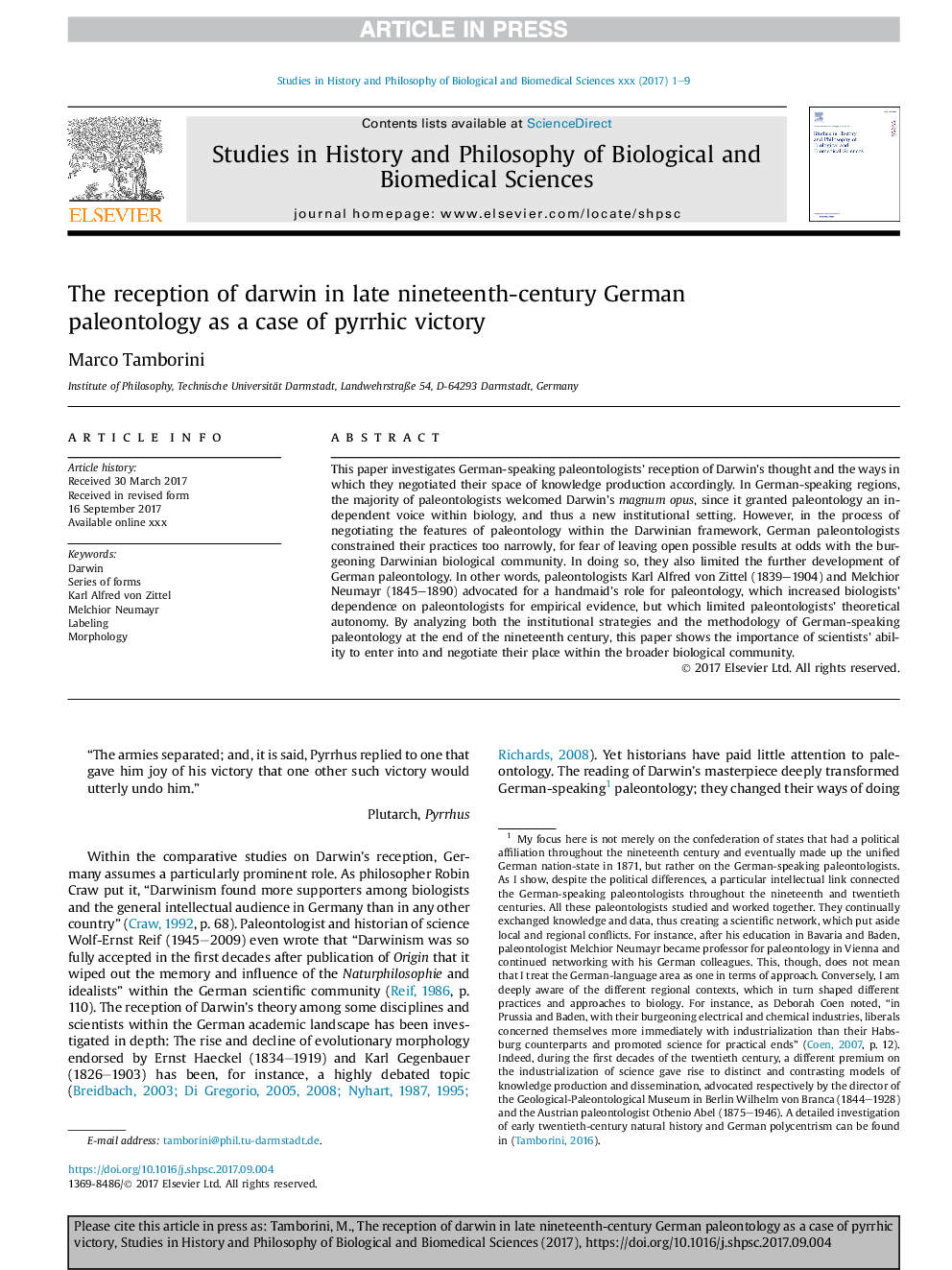| کد مقاله | کد نشریه | سال انتشار | مقاله انگلیسی | نسخه تمام متن |
|---|---|---|---|---|
| 7552109 | 1490499 | 2017 | 9 صفحه PDF | دانلود رایگان |
عنوان انگلیسی مقاله ISI
The reception of Darwin in late nineteenth-century German paleontology as a case of pyrrhic victory
ترجمه فارسی عنوان
پذیرش داروین در دیرباز دیرین شناس آلمانی در قرن نوزدهم به عنوان مورد پیروزی پیور
دانلود مقاله + سفارش ترجمه
دانلود مقاله ISI انگلیسی
رایگان برای ایرانیان
کلمات کلیدی
داروین، سری اشکال کارل آلفرد فون زیتل، ملچور نوریم، برچسب زدن، مرفولوژی،
ترجمه چکیده
این مقاله به بررسی پذیرش دیرینه شناسان آلمانی در مورد اندیشه داروین و شیوهای که در آن فضای تولید دانش خود را مطابق با آنها مذاکره می کند. در مناطق آلمانی زبان، اکثریت دین شناسان از چشم انداز داروین خوشامد می گویند؛ زیرا پیلوتولوژی یک صدای مستقل در زیست شناسی و به این ترتیب یک نهاد سازمانی جدید است. با این حال، در روند مذاکره در مورد ویژگی های دیرینه شناسی در چارچوب داروین، پینتو شناسان آلمانی بیش از حد محدود، به دلیل ترس از خروج از نتایج باز ممکن در مقابله با جامعه بیولوژیک رو به رشد داروین محدود است. در انجام این کار، آنها همچنین توسعه بیشتری از دیرینه شناسی آلمان را محدود کردند. به عبارت دیگر، کارل آلفرد فون زیتتل (1904-1839) و ملچیرن نویمیر (1890-1890)، پالئونتولوژیستها، نقش غیرمعمول برای دیرینهشناسی را تقویت کردند که باعث افزایش وابستگی زیست شناسان به دیرینه شناسان برای شواهد تجربی شد، اما محدودیت استقلال نظری دیرینهشناسان را محدود کرد. با تجزیه و تحلیل استراتژی های سازمانی و روش شناسی دیرینه شناس آلمانی در پایان قرن نوزدهم، این مقاله نشان دهنده اهمیت توانایی دانشمندان برای وارد شدن و مذاکره در محل خود در جامعه بیولوژیک وسیع است.
موضوعات مرتبط
علوم زیستی و بیوفناوری
علوم کشاورزی و بیولوژیک
علوم کشاورزی و بیولوژیک (عمومی)
چکیده انگلیسی
This paper investigates German-speaking paleontologists' reception of Darwin's thought and the ways in which they negotiated their space of knowledge production accordingly. In German-speaking regions, the majority of paleontologists welcomed Darwin's magnum opus, since it granted paleontology an independent voice within biology, and thus a new institutional setting. However, in the process of negotiating the features of paleontology within the Darwinian framework, German paleontologists constrained their practices too narrowly, for fear of leaving open possible results at odds with the burgeoning Darwinian biological community. In doing so, they also limited the further development of German paleontology. In other words, paleontologists Karl Alfred von Zittel (1839-1904) and Melchior Neumayr (1845-1890) advocated for a handmaid's role for paleontology, which increased biologists' dependence on paleontologists for empirical evidence, but which limited paleontologists' theoretical autonomy. By analyzing both the institutional strategies and the methodology of German-speaking paleontology at the end of the nineteenth century, this paper shows the importance of scientists' ability to enter into and negotiate their place within the broader biological community.
ناشر
Database: Elsevier - ScienceDirect (ساینس دایرکت)
Journal: Studies in History and Philosophy of Science Part C: Studies in History and Philosophy of Biological and Biomedical Sciences - Volume 66, December 2017, Pages 37-45
Journal: Studies in History and Philosophy of Science Part C: Studies in History and Philosophy of Biological and Biomedical Sciences - Volume 66, December 2017, Pages 37-45
نویسندگان
Marco Tamborini,
